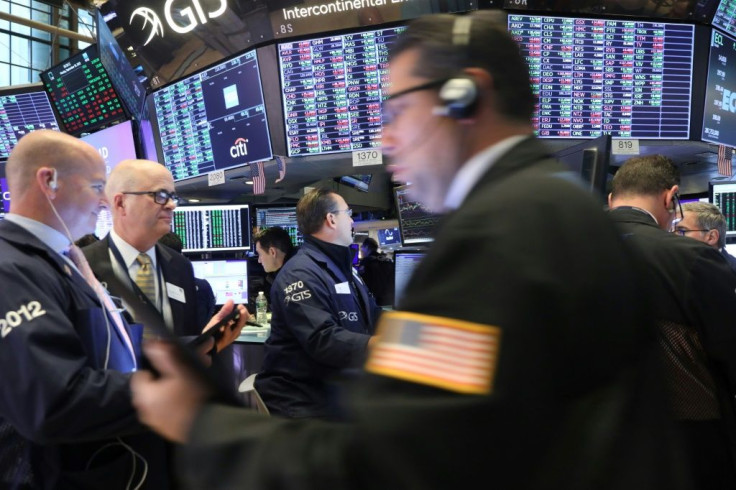Tuesday's Stock Market Close: US Equities Rebound On White House $1 Trillion Stimulus Plan, But Oil Drops

KEY POINTS
- Trump administration considering a fiscal stimulus package valued at more than $1 trillion
- Steven Mnuchin said corporations and individuals will be able to defer tax payments
- Some analysts predict global recession
U.S. stocks rose on Tuesday in volatile trading on reports the Trump administration is considering a fiscal stimulus package valued at more than $1 trillion, including direct payments to Americans hurt by the impact of coronavirus.
The Dow Jones Industrial Average jumped 1,049.27 points to 21,237.79 while the S&P 500 gained 142.91 points to 2,529.04 and the Nasdaq Composite Index rose 430.19 points to 7,334.78.
Volume on the New York Stock Exchange totaled 7.07 billion shares with 1,759 issues advancing, seven setting new highs, and 1,256 declining, with 1,308 setting new lows.
Active movers were led by General Electric Co. (GE), Bank of America (BAC) and Ford Motor (F).
Treasury Secretary Steven Mnuchin said corporations will be able to defer tax payments of up to $10 million while individuals could defer up to $1 million in payments to the Internal Revenue Service. Trump also authorized the deferral of $300 billion in IRS payments.
The Federal Reserve also unveiled a special credit facility to buy corporate paper -- unsecured short-term lending critical to business funding -- from issuers that have struggled to find buyers on the open market.
“This is a crucial market for basically short-term borrowing by companies, and if you don’t get this short-term borrowing, you can’t get payments out, you can’t pay your employees, you can’t pay your customers,” said Randall Kroszner, a former Fed governor. “If this freezes up, it’s a real problem.”
The U.S. has recorded at least 4,281 cases of coronavirus, along with more than 70 deaths.
“We know there’s going to be monetary policy. We know there’s going to be fiscal policy and we’re hearing more about that. That’s two legs of the stool,” said Art Hogan, chief market strategist at National Securities. “The federal health care policy response, that’s another one. I still think the information on that needs to get better.”
The National Association of Home Builders/Wells Fargo Housing Market Index fell from 74 points in February to 72 points in March.
The Commerce Department said business inventories slipped by 0.1% in January after an unchanged reading in December.
But some analysts are predicting a global recession.
“Global recession in 2020 is now our base case,” wrote Morgan Stanley chief economist Chetan Ahya. “With Covid-19 spreading in Europe and the U.S. after hitting Asia, the disruptions and dislocations in the economy and markets will trigger a [year over year] contraction in global growth in [the first half of 2020].”
Ahya expected global economic growth to amount to only 0.9% this year, “the lowest since the global financial crisis.”
“This time will be worse than the global recession of 2001. While the policy response will provide downside protection, the underlying damage from both Covid-19 ′ s impact and tighter financial conditions will deliver a material shock to the global economy, ” Ahya added.
“Although the contemporary crisis is loaded with bad news, this has not been its primary problem. It’s the ‘unknown,’” said Jim Paulsen, chief investment strategist at The Leuthold Group. “Not even health experts understand what this is or where it is headed, and that is the worst possible outcome for investors. Give me bad news any day over complete uncertainty.”
Overnight in Asia, markets were mixed. China’s Shanghai Composite slipped 0.34%, while Hong Kong’s Hang Seng gained 0.87%, and Japan’s Nikkei-225 edge up 0.06%.
In Europe markets closed higher as Britain’s FTSE-100 gained 1.34%, France’s CAC-40 advanced 1.23% and Germany’s DAX rose 1.13%.
Crude oil futures fell 5.89% at $27.01 per barrel, Brent crude dropped 0.17% at $28.68. Gold futures gained 3.01%.
The euro dropped 1.57% at $1.1005 while the pound sterling fell 1.52% at $1.2084.
The yield on the 10-year Treasury jumped 36.95% to 0.997% while yield on the 30-year Treasury dropped 14.05% to 1.334%.
© Copyright IBTimes 2024. All rights reserved.




















